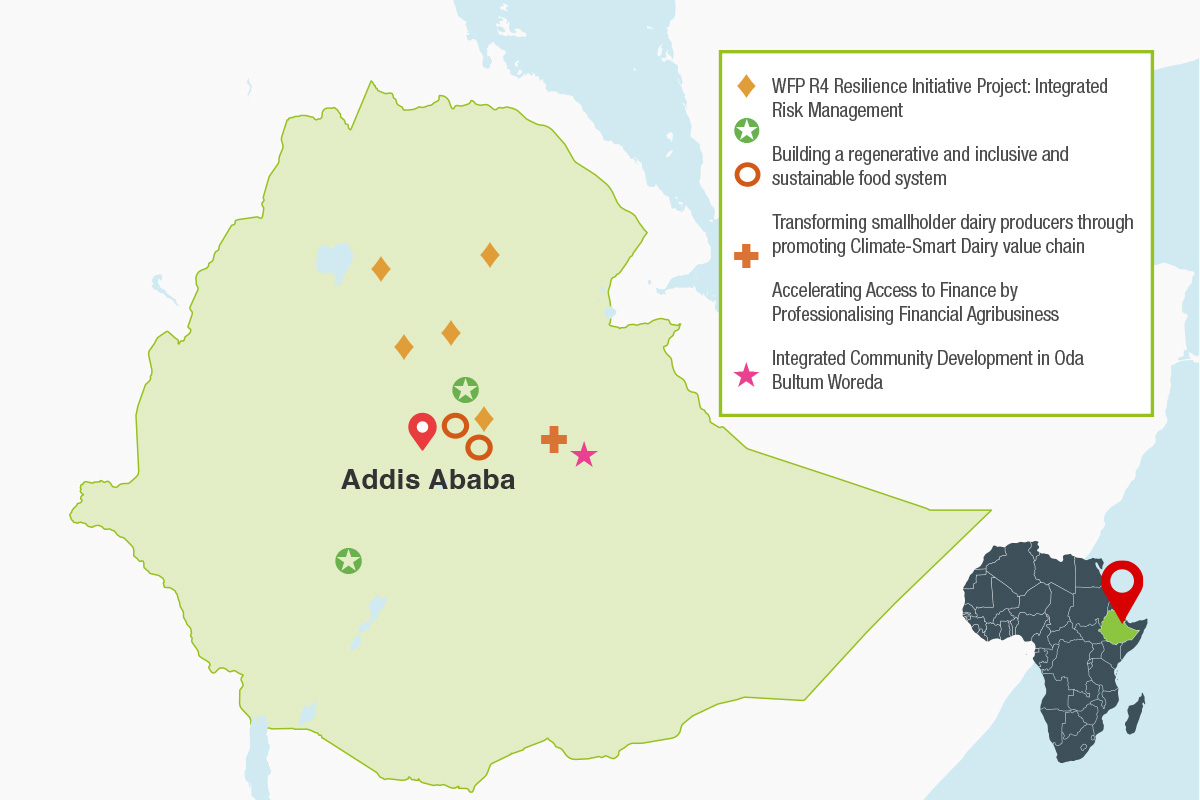our work
in ethiopia
Despite much progress, Ethiopia remains one of Africa’s poorest nations with a third of the population living below the poverty line (World Bank).
Scaling up agricultural production, improving nutrition security, developing new enterprise and market opportunities for farmers, strengthening community-based seed production and building climate resilience, are all key areas of Self Help Africa’s work in Ethiopia.
Full Name: Federal Democratic Republic of Ethiopia
Population: 123.379 million (World Bank, 2022)Capital: Addis Ababa
Area: 1,104,300 SQ KM (426,371 SQ Miles)
Major Languages: Amharic (Official)
Major Religions: Christianity, Islam, Traditional Beliefs
Ethiopia projects
Resilience Initiative Project: Integrated Risk Management
Funded by the World Food Programme, the Resilience Initiative project aims to improve food security, nutrition, and livelihoods for over 54,000 smallholder farmers vulnerable to climate-related shocks in Ethiopia by 2024.
The proposed activities will be delivered in line with the R4 Rural Resilience Initiative results framework, with the overall goal of contributing to improved food security, nutrition and livelihoods of smallholder farmers vulnerable to climate-related shocks by 2024.
The programme activities will focus on four components, focused around risk:
- Risk Reduction: Improved natural resource management and disaster risk reduction through asset rehabilitation and creation.
- Risk Transfer: Assist farmers in coping with, and recovering more quickly from, extreme climate events.
- Risk Retention: Strengthen financial literacy, savings capacity of food insecure households.
- Prudent Risk Taking: Enhanced access for smallholder famers to to microloans, credit and technical assistance to diversify and increase their incomes.
This will include:
- Access to index insurance products, loans and fuel-efficient stoves,
- Rehabilitation/creation of natural and physical community assets,
- Establishment of committees for community maintenance of natural/physical assets,
- Use of improved agricultural techniques to better face climate shocks
- Organisation of Village Economy and Savings Associations
- Market linkages
Participants: 54,000 households
Building a regenerative and inclusive and sustainable food system for transforming rural livelihoods in Ethiopia
The overall objective of the project is to With funding from Irish Aid, this project aims to contribute to better livelihoods and sustained food security and nutrition of vulnerable smallholder farmers through more sustainable, inclusive and resilient food systems in Asagirt and Kindo Koysha in Ethiopia.
Ethiopia's food system is under great pressure both from non-climate, and climate-related stressors. This project is designed to transform the current food systems, to promote increased production of diversified and nutritious food, to generate sustainable income and employment opportunities, while maintaining and regenerating the natural environment.
Participants: : 15,000 direct (30% female)
Transforming smallholder dairy producers through promoting Climate-Smart Dairy value chain
Objective: Increased food security and disposable income of smallholder households from dairy production in Ethiopia
Blurb: This project aimed to increase dairy productivity through adoption of climate-smart practices, breed improvement, availability of timely extension services, and promotion of livestock businesses into smallholder dairy farmers farming activities in two districts in Ethiopia. The project will enable 2,000 dairy farm households in Abichu Gna’a and Siya Debrena Wayu districts to increase their income from dairy and to improve the nutritional status of 12,000 people through increased awareness on nutrition consumption of milk products.
Beneficiaries: 2,000 direct (50% women)
Accelerating Access to Finance by Professionalising Financial Agribusiness
Self Help Africa are part of a consortium working to develop the SCOPE Insight tool for Savings and Credit Cooperatives (SACCOs) and SACCO Unions.,
The project will scale up and standardise the SCOPE Insight tool to make it more relevant and applicable for SACCOs, given their unique role of SACCOs in building local financial capital. These insights will help to inform the specialised training and coaching plans to support the professionalisation of the SACCO sector.
Self Help Africa’s role in this consortium is to pilot the new SCOPE Insight tool with existing SACCO partners. The tool is being developed in partnership with SCOPE Insight, Nuru International, ICCO (part of Cordaid) and Glimmer of Hope.
Once the tool has been developed and staff trained in its use, SHA will pilot it as a monitoring tool with existing partner RuSACCOs.
Integrated Community Development in Oda Bultum Woreda
The aim of this project is to alleviate deep-rooted poverty, and to build sustainable livelihoods and strengthen community resilience by improving food security and nutrition for rural households vulnerable to food insecurity in 14 rural kebeles in Oda Bultum Woreda.
The following issues will be addressed through the project, funded by Glimmer of Hope:
- Low crop and livestock production and productivity
- Limited access to markets and financial services
- Poor nutrition
- Unequal gender relations.
Farmers participating in the projectwill have access to high-quality agricultural inputs. They will also have access to credit through the RuSACCOs which allow them to invest in these inputs or in livestock such cows, goats, and poultry.
Farmers also receive training in crop production, processing, and storage as well as the care and welfare of their livestock to ensure maximum productivity and income generation.
This is to ensure the farmers make the most from their investment and can repay their loan.. The repayments to the RuSACCOs and multipurpose cooperatives can then be used to support other farmers, creating a ‘revolving’ system which can be sustained long after the project closes.
Participants: 18,887 smallholder farmer households; 95,721 people in the Oda Bultum ICD target area.
TO CONTACT US ABOUT OUR WORK IN Ethiopia:
Yeka Subcity, Kebele 08,
House No. 912, P.O. BOx 1204,
Addis Ababa
Tel. +251 116 182556 / 251 116 591803 / 116 620659/0116
Email: [email protected]
